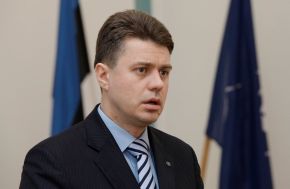Estonia, Financial Services, Legislation, Risk management, Shadow economy
International Internet Magazine. Baltic States news & analytics
Wednesday, 24.04.2024, 15:58
Extensive money-laundering investigation should be organized by EPPO – minister
 Print version
Print version |
|---|
| Urmas Reinsalu, Estonian Minister of Justice. BC. |
Reinsalu said in a statement that according to Europol, only two% of all
criminal income is caught in the European Union. "In order to ensure
that organized crime does not pay off, we must among other things hinder
money-laundering," Reinsalu said.
The minister said that the criminal procedure of extensive cross-border
money-laundering cases would in the future be led internationally by the
European Public Prosecutor's Office (EPPO). According to Reinsalu, this will
improve international cooperation. The rules of the European Union hindering
money-laundering must also be amended, foremost stipulating a rule across
the European Union that the burden of reverse proof is in effect in
the case of the administrative confiscation of large sums with a suspicion of
money-laundering.
Reinsalu along with his Finnish colleague also gave an overview how
artificial intelligence is being used in the justice system in Estonia.
"Data is an extremely valuable tool on today's globally digital market.
When we talk about artificial intelligence, it is important to find a balance
between the free movement of data and privacy. This issue is especially sharp
in the justice system, especially in courts, which is why it is very welcome
that this discussion was once again opened with Nordic and Baltic colleagues
today," the minister said.
The minister showcased several planned activities regarding artificial
intelligence, like the idea of a robot judge, that should simplify the work of
a judge, bringing the necessary information automatically to the judges and
pre-generating decisions itself in simpler cases. The minister also spoke about
the digitalization of criminal proceedings, one part of which is to use artificial
intelligence for optimizing the procedure, for example when finding patterns in
procedure data or making video material searchable.
The Nordic and Baltic justice ministers meet every two years, the last
meeting took place in Estonia in September 2016.








 «The Baltic Course» Is Sold and Stays in Business!
«The Baltic Course» Is Sold and Stays in Business!

